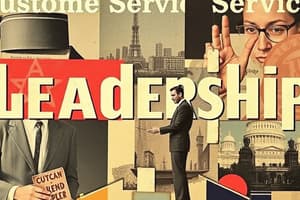Podcast
Questions and Answers
Recognition programs help to keep customer service providers motivated.
Recognition programs help to keep customer service providers motivated.
True (A)
Wants are more essential for survival than primary needs like air and food.
Wants are more essential for survival than primary needs like air and food.
False (B)
Humor is considered an unimportant aspect of a motivated workplace.
Humor is considered an unimportant aspect of a motivated workplace.
False (B)
Daily encouragement from management is a strategy to motivate customer service employees.
Daily encouragement from management is a strategy to motivate customer service employees.
Wants are directly related to essential needs in the workplace.
Wants are directly related to essential needs in the workplace.
Customer service often involves dealing with problems and upset customers.
Customer service often involves dealing with problems and upset customers.
Having a positive self-concept is irrelevant to achieving success in customer service.
Having a positive self-concept is irrelevant to achieving success in customer service.
One effective way to motivate yourself is to post motivating quotations at your workstation.
One effective way to motivate yourself is to post motivating quotations at your workstation.
To improve customer service performance, individuals should ignore setting personal goals.
To improve customer service performance, individuals should ignore setting personal goals.
Practicing positive self-talk can detract from your ability to provide excellent customer service.
Practicing positive self-talk can detract from your ability to provide excellent customer service.
Flashcards
Self-concept
Self-concept
The ability to recognize and value one's own strengths, skills, and positive qualities.
Goal setting
Goal setting
Setting clear, achievable goals and working actively towards them.
Positive self-talk
Positive self-talk
Using positive affirmations and self-encouragement to maintain a positive attitude.
Self-motivation
Self-motivation
Signup and view all the flashcards
Positive attitude in customer service
Positive attitude in customer service
Signup and view all the flashcards
Needs
Needs
Signup and view all the flashcards
Wants
Wants
Signup and view all the flashcards
Intrinsic Motivation
Intrinsic Motivation
Signup and view all the flashcards
Extrinsic Motivation
Extrinsic Motivation
Signup and view all the flashcards
Employee Motivation
Employee Motivation
Signup and view all the flashcards
Study Notes
Motivation
- Motivation is crucial for any workforce, especially in customer service
- Ideal motivation in customer service originates from management
- Methods to boost customer service provider passion include:
- Recognition programs
- Suggestion rewards
- Daily encouragement
- Some organizations use unique strategies like humor to motivate employees.
- Other companies offer perks like snack days, casual dress days, and opportunities to participate in company activities (softball, concerts, etc.)
Needs and Wants
-
Needs are basic requirements (e.g., air, food)
-
Learned needs can also motivate people (e.g., certain foods, or activities)
-
These learned needs are called secondary needs
-
Both primary and secondary needs are essential to motivation.
-
Wants are desired things or experiences
-
Wants have little to do with needs, but may display or reflect a desire for success to others.
-
Employees' needs are often misjudged by management
-
Offering things like better tools (laptops) might not be the best motivation, as better recognition or flexible hours could be more motivating.
Essay Question
- Studies show extensive research on understanding what motivates adults
- There are common factors that can motivate adults, which include some general aspects about workplace needs
Factors Affecting Employee Motivation
- Individual Factors: Work-life balance, respect, financial security
- Organizational Factors: Leadership, rewards, recognition, development opportunities, creativity opportunities, job security, management encouragement
- Environmental Factors: Work environment, challenging work, emotional support, culture, norms, customs
Employee Motivation Survey Data
- UAE Employees:
- Work-life balance is highly valued (75%)
- Organizational support is important (60%)
- Recognition of work and achievements is important (47%)
- Training and development opportunities are important (45%)
- Career advancement opportunities are important (42%)
- Participating in decision-making is valued (40%)
- Being able to set and reach goals is also valued (31%)
- Personal fulfillment and opportunities for long-term career growth are important (39%,39%)
- Colleagues and work environments are also contributing factors for motivating employees (37%, 31%)
- The nature of daily responsibilities are also contributors (31%)
Individual Motivation Factors
- Many adults are not motivated by all factors.
- Understanding individual motivators is essential for effectiveness
- Employers need to recognize that people need to feel good in their job and situation
- Focus on other motivators to enhance workplace morale like improving pay rates
Morale
- High morale- Results when employees are content with their work and secure in their jobs, which can lead to increased productivity and appropriate job participation. High morale also leads to loyalty to the organization
- High morale comes from supportive management, unified work environment, and success in individual, department, or corporate performance
- Low morale- When employees and potentially managers are feeling negative about their work and the organization. Low morale can lead to absenteeism, unprofessional behavior, high turnover. Low morale can be impacted by poor management, dissatisfaction with the workplace, uncertain future, rumored layoffs, excessive work, and less desirable salary increases
- Factors like poor management, uncertainty about the company's future, and excessive work often contribute to low morale.
Self-Concept
- Self-concept is the way a person views themselves and how they believe others see them.
- Self-concept is linked to motivation and productivity in groups
- Strong self-concept individuals view their skills positively and don't rely on others' affirmations
- Customer service providers need to develop a strong self-concept as this helps keep customer interactions in perspective
Self-Assessment
- Self-assessment is crucial for improving self-concept
- Identifying strengths and weaknesses is the first step in self-improvement
- Self-assessment is focused on the individual and avoiding misdirecting elements
Tips for Improving Self-Concept
-
Mind: See yourself as successful, reward successes, learn something new, practice positive self-talk, break tasks down into steps, spend time with positive people
-
Body: Eat well, get enough sleep, exercise
Power of Self-Motivation
- Customer service is often a thankless job.
- Employees need internal motivation even if they do not get rewards from management
- The ability to review a situation and get motivated by oneself is essential to excel in customer service
Teamwork
- Employees prefer working in teams, which improves efficiency in completing projects
- Teamwork leads to improved work quality, lower stress, better attitudes, higher profitability, and increased productivity (per a survey conducted for Dale Carnegie & Associates)
Ways to Say Thank You and Motivate Others
- Offer extra time off (lunch break extension)
- Provide small gifts (donuts for entire department)
- Send notes of thanks
- Give tickets to company events
- Acknowledge employee contributions
- Designate casual days
- Allow employees to leave early
Quick Quiz:
- Most people are motivated by similar factors (T)
- Humor is a motivating factor (F)
- Personal requirements are known as needs (T)
- Wants are unrelated to needs (T)
- High morale doesn't always correlate with low absenteeism or high turnover (F)
- People with strong self-concepts don't rely on others for affirmation (T)
- "Bad luck" is not a suitable excuse for lack of achievement (F)
- People can improve their self-concept (T)
- Motivational books help increase motivation (T)
- Appreciation does not significantly boost job satisfaction (F)
Studying That Suits You
Use AI to generate personalized quizzes and flashcards to suit your learning preferences.




